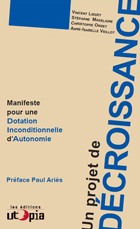 The Greeks are being subjected to an unprecedented austerity plan by an illegitimate government under the thumb of the banks, the IFM and the EU.
The Greeks are being subjected to an unprecedented austerity plan by an illegitimate government under the thumb of the banks, the IFM and the EU.
During Sunday night February, 12th, the Greek Parliament has ratified a package, one we could label “a poverty package” (in a society advocating affluence) since it ties up international financial aid (IMF and EU) to unheard of, drastic, antisocial measures: reduction of minimum wage, axing public service jobs, slashing pensions, cuts to the health budget and an ongoing programme of privatisations.
The Greek Parliament has embarked on such a plan, following other austerity plans, to face up to its obligation to pay its debt back.
The Greek debt has increased by over 30% from 2008 to 2011. During that time, its GDP fell by more than 10%, whilst unemployment rose to 18%. And, with an official interest rate at 32%, it goes without saying than Greece is unable to access funds on the financial markets. It will be the case for a quite a long time to come. The impact of the debt on wealth creation has been increasing gradually. And, unless the massive debt is cancelled, these dynamics will keep on unfolding into a diabolical spiral ever increasing the poverty level.
Yet, as we have already mentioned in a previous communication, austerity packages lead to a social degradation and a marked instability since they affect the most disadvantaged. Austerity aims at kick starting an economic growth, which, once back on track, will trigger an even more devastating crisis. While capitalism is chasing its tail, more and more people are impoverished.
That is why the Greek people have taken to the streets. Greece, the cradle of the democratic concept, might be paving the way for the fight against corruption fuelled by the continuous pressure from the multinationals and the mafias of the financial oligarchy.
Faced with the onslaught of an unprecedented social crisis, the Greeks, anaesthetised by decades of consumerism and impostures of the neo-liberal ideology, as are the other European countries, are showing a resistance not seen in other European countries.
The Degrowth Party (PPLD – Parti Pour La Decroissance) stands by this movement since all political measures leading to a social and cultural degradation cannot be justified on an economic ground alone, we ask:
A refusal to pay the illegitimate part of the debt back.
To stop the private monetary creation and return it to the public sphere by granting powers to the public banks (national and local) and to advocate for the creation of soft local currencies coupled with the creation of transition initiatives such as the relocalisation of the economy.
To implement a maximum income level whereby any income above this threshold, would be fully taxed by the State.
The instauration of The UAA (Unconditional Autonomy Allowance), a political, economic and social tool for a transition and emancipation able to trigger a societal repoliticisation. This allowance could initially be paid as a subsistence revenue, extending to rights of access (health, education), rights of usage (energy, water) and the creation of soft local currencies for the purchase of locally produced essential products and services.
Furthermore the Degrowth Party supports every citizen movement asking for a public audit of the debt and a real democracy, where the economy is designed to serve people. The capitalist system has demonstrated its inability to guide humanity through progress in harmony with the environment; we demand that, in these pivotal times, another societal project be given consideration: the Degrowth project.


